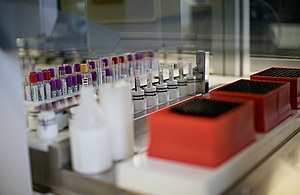The Health Secretary Matt Hancock announced today that all essential workers in England, and members of their households who are showing symptoms of coronavirus will now be able to get tested.
This will mean individuals and people they live with will have the reassurance of knowing whether their symptoms are caused by coronavirus and can decide whether they are well enough to return to work.
A new campaign will help essential workers in England – including NHS and care staff, teachers, hospital cleaners, public servants, the emergency services, supermarket staff, delivery drivers, and other critical infrastructure staff – to access testing.
Booking the test has been made simpler via a new online system. From today, employers can register and refer self-isolating staff, and from tomorrow employees will be able to book a test directly for themselves or members of their household who are experiencing symptoms – a high temperature or new continuous cough.
This will speed up the process of getting an appointment and take the burden off employers, helping reach everyone who has symptoms at the earliest opportunity.
Secretary of State for Health and Social Care Matt Hancock said:
“We have already prioritised testing for patients and health and social care workers and other key workers today I can go further.
“We are making it easier, faster and simpler for any essential worker in England who needs a test to get a test. From today, employers of essential workers will be able to go on GOV.UK to get a test for any of their staff who need a test. And from tomorrow, any essential workers who need a test will be able to book an appointment on GOV.UK themselves directly.
“This all applies for people in essential workers’ households who need a test too. It’s all part of getting Britain back on her feet.”
Essential workers using the new portal can enter their details and will then receive a text or email the same day inviting them to either book an appointment at one of more than 30 drive-through testing sites across the country, or receive a home testing kit.
Test results from the drive-through sites will be sent out by text within 48 hours, and within 72 hours of collection of the home delivery tests.
The aim is that most people should not have to drive for more than 45 minutes to get to a regional testing site.
This is the latest list of essential workers that the Government has announced
- all NHS and social care staff, including:
- doctors, nurses, midwives, paramedics, social workers, care workers, and other frontline health and social care staff including volunteers
- the support and specialist staff required to maintain the UK’s health and social care sector
- those working as part of the health and social care supply chain, including producers and distributors of medicines, and medical and personal protective equipment
- essential public services staff, including:
- prisons, probation, courts and tribunals staff, judiciary
- religious staff
- charities and workers delivering critical frontline services
- those responsible for the management of the deceased
- journalists and broadcasters covering coronavirus or providing public service broadcasting
- public safety and national security staff, including:
- police and support staff
- Ministry of Defence civilians, contractors and armed forces personnel (those critical to the delivery of critical defence and national security outputs and critical to the response to the coronavirus pandemic)
- fire and rescue service employees (including support staff),
- National Crime Agency staff, those maintaining border security, prison and probation staff and other national security roles, including those overseas
- Transport workers, including:
- those who keep the air, water, road and rail passenger and freight transport modes operating during the coronavirus response
- those working on transport systems through which supply chains pass
- education and childcare workers, including:
- support and teaching staff
- social workers
- specialist education professionals
- critical personnel in the production and distribution of food, drink and essential goods, including:
- those involved in food production, processing, distribution, sale and delivery
- those critical to the provision of other essential goods, such as medical supply chain and distribution workers, including veterinary medicine
- workers critical to the continuity of essential movement of goods
- local and national government staff critical to the effective delivery of the coronavirus response, or delivering essential public services, such as the payment of benefits
- public and environmental health staff, including in government agencies and arm’s length bodies
- frontline local authority staff, including those working with vulnerable children and adults, with victims of domestic abuse, and with the homeless and rough sleepers
- utilities, communication and financial services staff, including:
- staff needed for essential financial services provision (including but not limited to workers in banks, building societies and financial market infrastructure)
- the oil, gas, electricity and water sectors (including sewerage)
- information technology and data infrastructure sector and primary industry supplies to continue during the coronavirus response
- essential staff working in the civil nuclear, chemicals, telecommunications (including but not limited to network operations, field engineering, call centre staff, IT and data infrastructure, 999 and 111 essential services), postal services and delivery, payments providers and waste disposal sectors







